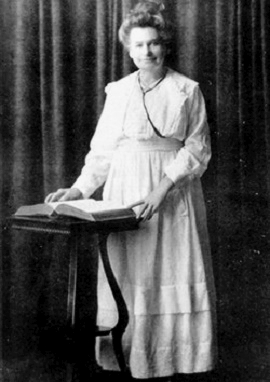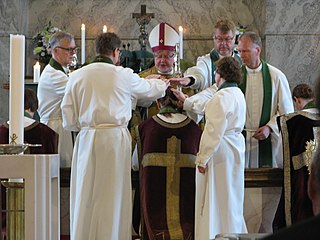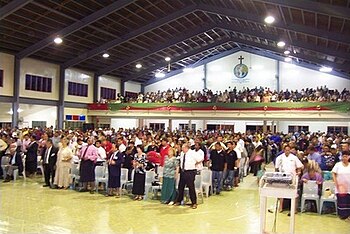Pentecostalism or classical Pentecostalism is a Protestant Charismatic Christian movement that emphasizes direct personal experience of God through baptism with the Holy Spirit. The term Pentecostal is derived from Pentecost, an event that commemorates the descent of the Holy Spirit upon the Apostles and other followers of Jesus Christ while they were in Jerusalem celebrating the Feast of Weeks, as described in the Acts of the Apostles.
Oneness Pentecostalism is a nontrinitarian religious movement within the Protestant Christian family of churches known as Pentecostalism. It derives its name from its teaching on the Godhead, a form of Modalistic Monarchianism commonly referred to as the Oneness doctrine. The doctrine states that there is one God―a singular divine spirit with no distinction of persons―who manifests himself in many ways, including as Father, Son, and Holy Spirit. This stands in sharp contrast to the mainstream doctrine of three distinct, eternal persons posited by Trinitarian theology.
The Statement of Fundamental Truths is a confession of faith outlining the 16 essential doctrines adhered to by the Assemblies of God USA. These doctrines are heavily based on other evangelical confessions of faith but differ by being clearly Pentecostal. Of the 16 articles, four are considered core beliefs "due to the key role they play in reaching the lost and building the believer and the church". They are the doctrines concerning salvation, the baptism in the Holy Spirit, divine healing, and the Second Coming of Christ. The Statement of Fundamental Truths has undergone several permutations since its original adoption in 1916 despite common claims that it has remained largely unchanged.

The World Assemblies of God Fellowship (WAGF) is a global cooperative body of over 170 Pentecostal denominations that was established on August 15, 1989. WAGF was created to provide structure so that member denominations, which previously related to each other informally, could more easily cooperate on a global basis.

The Church of God of Prophecy (COGOP) is a Holiness Pentecostal Christian Church. It is one of six Church of God bodies headquartered in Cleveland, Tennessee that arose from a small meeting of believers who gathered at the Holiness Church at Camp Creek near the Tennessee/North Carolina border on Saturday, June 13, 1903. The Church of God of Prophecy has congregations and missions in over 135 countries, with a membership of over 1,500,000. Membership in the United States as of 2010 was 98,407 in 1,743 churches. Ministries of the Church include homes for children, bible training institutes, youth camps, ministerial aid, and Spirit and Life Seminary. The Church operates Fields of the Wood, a Bible theme park and popular tourist attraction, near Murphy, North Carolina.

The International Pentecostal Holiness Church (IPHC) or simply Pentecostal Holiness Church (PHC) is an international Holiness-Pentecostal Christian denomination founded in 1911 with the merger of two older denominations. Historically centered in the Southeastern United States, particularly the Carolinas and Georgia, the Pentecostal Holiness Church now has an international presence. In 2023, the denomination released a report showing 1,691,750 members outside the United States, Canada and Brazil. Worldwide figures are estimated at around 2 million members.
The Independent Assemblies of God International (IAOGI) is a pentecostal Christian association with roots in a revival of the 1890s among the Scandinavian Baptist and Pietist communities in the United States. Independent Assemblies of God International is a member of the Pentecostal/Charismatic Churches of North America. International offices are located in Laguna Hills, California.

The Pentecostal Church of God (PCG) is a Finished Work Pentecostal denomination of Christianity headquartered in Bedford, Texas, United States. As of 2010, there were 620,000 members, 6,750 clergy in 4,825 churches worldwide.

The Foursquare Church is an international Evangelical Pentecostal Christian denomination founded in 1923 by evangelist Aimee Semple McPherson. Its headquarters are in Los Angeles, California, United States.
In Christian theology, baptism with the Holy Spirit, also called baptism in the Holy Spirit or baptism in the Holy Ghost, has been interpreted by different Christian denominations and traditions in a variety of ways due to differences in the doctrines of salvation and ecclesiology. It is frequently associated with incorporation into the Christian Church, the bestowal of spiritual gifts, and empowerment for Christian ministry. Spirit baptism has been variously defined as part of the sacraments of initiation into the church, as being synonymous with regeneration, or as being synonymous with Christian perfection. The term baptism with the Holy Spirit originates in the New Testament, and all Christian traditions accept it as a theological concept.

Charles Fox Parham was an American preacher and evangelist. Together with William J. Seymour, Parham was one of the two central figures in the development and initial spread of early Pentecostalism, known as Holiness Pentecostalism. It was Parham who associated glossolalia with the baptism in the Holy Spirit, a theological connection crucial to the emergence of Pentecostalism as a distinct movement. Parham was the first preacher to articulate Pentecostalism's distinctive doctrine of evidential tongues, and to expand the movement.

The Pentecostal Assemblies of Canada (PAOC) is a Finished Work Pentecostal denomination of Christianity and the largest evangelical church in Canada. Its headquarters is located in Mississauga, Ontario. The PAOC is theologically evangelical and Pentecostal, emphasizing the baptism with the Holy Spirit with the evidence of speaking in tongues. It historically has had strong connections with the Assemblies of God in the United States. It is affiliated with the Evangelical Fellowship of Canada and the World Assemblies of God Fellowship.

Maria Beulah Woodworth-Etter was an American healing evangelist. Her ministry style was a model for Pentecostalism and the later Charismatic movement, earning her the title "Mother of Pentecost" in some circles.

The Apostolic Faith Mission of South Africa (AFM) is a classical Pentecostal Christian denomination in South Africa. With 1.2 million adherents, it is South Africa's largest Pentecostal church and the fifth largest religious grouping in South Africa representing 7.6 percent of the population. Dr. Isak Burger has led the AFM as president since 1996 when the white and black branches of the church were united. It is a member of the Apostolic Faith Mission International, a fellowship of 23 AFM national churches. It is also a member of the South African Council of Churches. The AFM is one of the oldest Pentecostal movement is South Africa with roots in the Azusa Street Revival, the Holiness Movement teachings of Andrew Murray and the teachings of John Alexander Dowie. The AFM had an interracial character when it started, but, as in American Pentecostalism, this interracial cooperation was short-lived. The decades from the 1950s to the 1980s were marked by the implementation of apartheid. After 1994, the white AFM moved rapidly towards unification with the black churches. By 1996, all the AFM churches were united in a single multi-racial church. The constitution of the AFM blends at the national level the elements of a presbyterian polity with an episcopal polity. Decentralization is a major feature of its constitution, which allows local churches to develop their own policies. The Apostolic Faith Mission displays a variety of identities and ministry philosophies, including seeker-sensitive, Word of Faith, Presbyterian, and classical Pentecostal.

The Assemblies of God USA (AG), officially The General Council of the Assemblies of God, is a Pentecostal Christian denomination in the United States and the U.S. branch of the World Assemblies of God Fellowship, the world's largest Pentecostal body. The AG reported 2.9 million adherents in 2022. In 2011, it was the ninth largest Christian denomination and the second largest Pentecostal denomination in the United States. The Assemblies of God is a Finished Work denomination, and it holds to a conservative, evangelical and classical Arminian theology as expressed in the Statement of Fundamental Truths and position papers, which emphasize such core Pentecostal doctrines as the baptism in the Holy Spirit, speaking in tongues, divine healing and the Second Coming of Jesus Christ.
The New Zealand Samoan Assemblies of God (SA/G) or (SAOG), officially The General Council of the Samoan Assemblies of God in New Zealand Inc. are a group of Pentecostal congregations predominantly made up of Samoan people. They are affiliated with the Samoan Assemblies of God church.

In Christianity, the laying on of hands is both a symbolic and formal method of invoking the Holy Spirit primarily during baptisms and confirmations, healing services, blessings, and ordination of priests, ministers, elders, deacons, and other church officers, along with a variety of other church sacraments and holy ceremonies.

The Swedish Pentecostal Movement is a Pentecostal movement in Sweden. Many, but not all, of these, are members of the Pentecostal Alliance of Independent Churches, which was founded in 2001. The Pentecostal movement spread to Sweden by 1907 from the 1904–1905 Welsh Revival and the Azusa Street Revival in Los Angeles in 1906.
Evangelical theology is the teaching and doctrine that relates to spiritual matters in evangelical Christianity and a Christian theology. The main points concern the place of the Bible, the Trinity, worship, salvation, sanctification, charity, evangelism and the end of time.

Holiness Pentecostalism is the original branch of Pentecostalism, which is characterized by its teaching of three works of grace: [1] the New Birth, [2] entire sanctification, and [3] Spirit baptism evidenced by speaking in tongues. The word Holiness refers specifically to the belief in entire sanctification as an instantaneous, definite second work of grace, in which original sin is cleansed and the believer is made holy, with the heart being made perfect in love.














